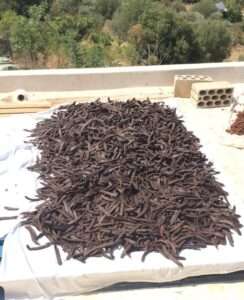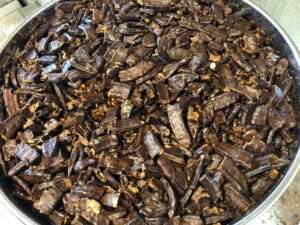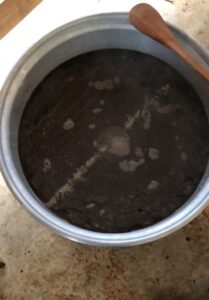bassatin baanoub in january
January is a busy month for Bassatin Baanoub. While the Origanum syriacum, which makes their za’atar mix, is quietly getting on with life, there are plenty of other things to do. Shovelling manure to nurture trees and keeping beehives healthy by burning, then soaking the hives in hot linseed oil, are just two of the tasks required. While they might appear on many farmers’ January to-do list, Yasmina’s “sensible precautions” probably won’t – unless you farm in Lebanon and Palestine.

carob seed pods picked in August, washed, drying in the sun
taking sensible precautions
Farming close enough to hear some of the bombing on the villages of Marjaayoun and Kafar Killa, means that the Bassatin Baanoub team need to be prepared in case there is a closer strike on the land. Googling “what to do when phosphorus explodes beside you” illustrates the reality of living conditions for those in the south. Israel has dropped phosphorus bombs over the last 3 months in south Lebanon. The ecological damage to areas south of Bassatin Baanoub, such as Deir Mimas, famous for its olive oil, is considerable. Living with the endless buzz of surveillance drones and the frightening sonic boom created by Israeli jets is a disturbing new normal. Luckily since Yasmina has carob molasses to make, her thoughts are elsewhere.

cracked manually, then crushed by machine before soaking overnight
what's carob molasses?
Like pomegranate molasses, carob molasses is another hugely popular ingredient in Lebanon. When mixed with tahini (think peanut butter and jam but much more sophisticated) this dark brown earthy treacle-like substance is food for the soul. The making of it is akin to alchemy.
From the legume family, the carob tree is a survivor from the ice age. Its long flat dark leathery pods are gathered in August, washed and left to dry in the sun. January, being cooler, is the month to make the molasses, with no fear of fermentation. The crushed pods are soaked overnight, before the extracted pulp and the sweet water is heated. After the first 5 or 6 hours of boiling “which is boring” Yasmina says, “it’s the final two hours where the magic happens“

extracted pulp and sweet water ready for reduction
bit like marmalade
Reduced to 10-15% of its weight, Yasmina tests some on a cold plate. A bit like testing for marmalade’s setting point, here when the golden foam remains on top of the liquid, the molasses is ready to be bottled.
Next on the list is making marmalade, from this year’s bumper crop of “bou sfeir”– bitter oranges. With just enough oregano added to make this their signature conserve, it’s a marmalade triumph. Yasmina also has in mind to make bitter orange peel saturated in syrup, and “pâte de fruit” and fruit leather, if her hands and time allow. We hope to be able to import some of these delicious products soon.
